Commons Seminars
What is a Commons Seminar?
 Commons Seminars are intended to prepare first-year students to pursue their passions by modeling rigorous, compelling, and unique projects in addition to exposing students to a particular seminar theme. Commons Seminar topics help students imagine ways to make a difference in the world by introducing them early on to the questions of why, how, and where having an immersive experience might make a difference in their undergraduate careers.
Commons Seminars are intended to prepare first-year students to pursue their passions by modeling rigorous, compelling, and unique projects in addition to exposing students to a particular seminar theme. Commons Seminar topics help students imagine ways to make a difference in the world by introducing them early on to the questions of why, how, and where having an immersive experience might make a difference in their undergraduate careers.
Commons Seminars for the Class of 2028
Any questions about taking a seminar class can be sent to commons@vanderbilt.edu. Those interested in offering a seminar can email Dean Gresalfi.
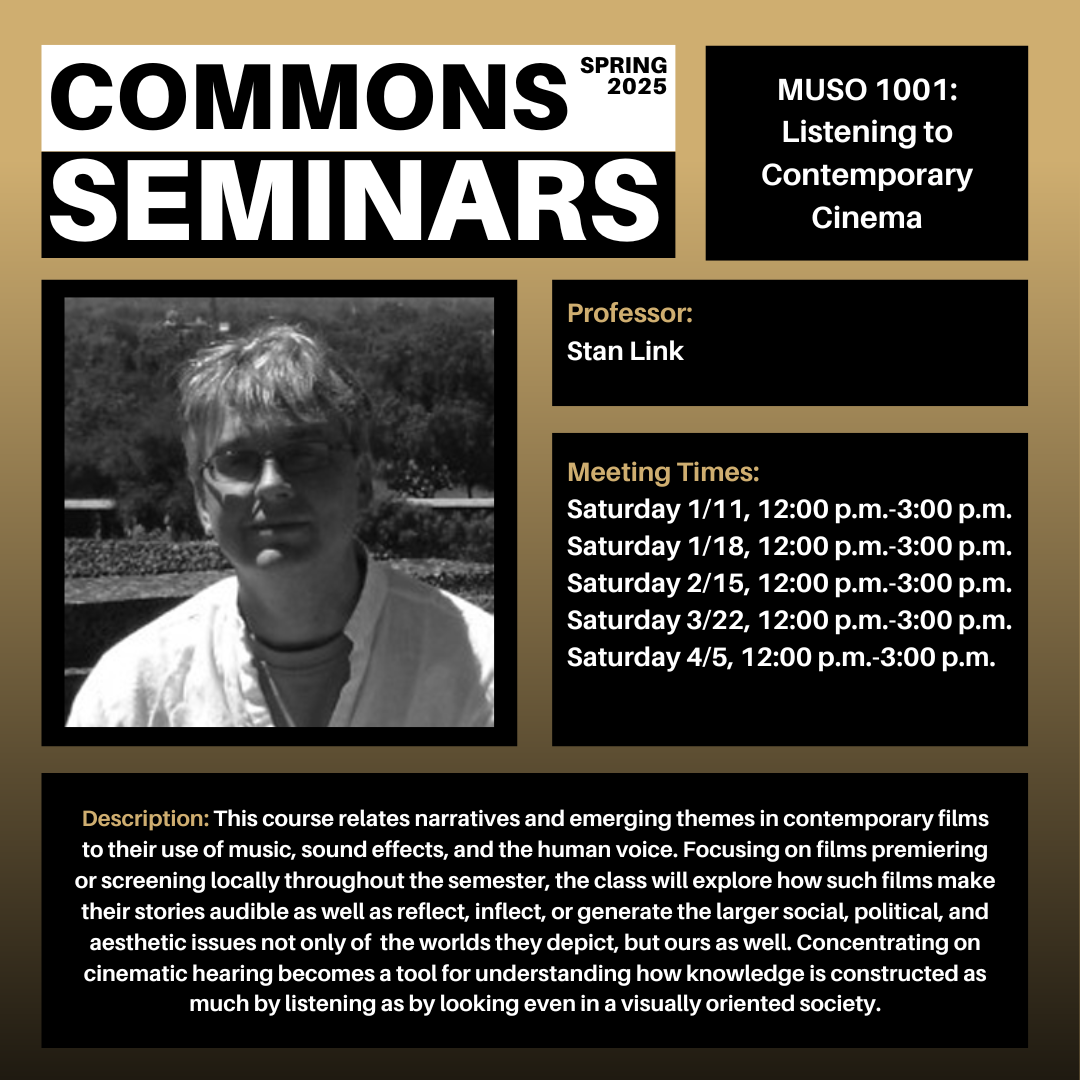
This course relates narratives and emerging themes in contemporary films to their use of music, sound effects, and the human voice. Focusing on films premiering or screening locally throughout the semester, the class will explore how such films make their stories audible as well as reflect, inflect, or generate the larger social, political, and aesthetic issues not only of the worlds they depict, but ours as well. Concentrating on cinematic hearing becomes a tool for understanding how knowledge is constructed as much by listening as by looking even in a visually oriented society.
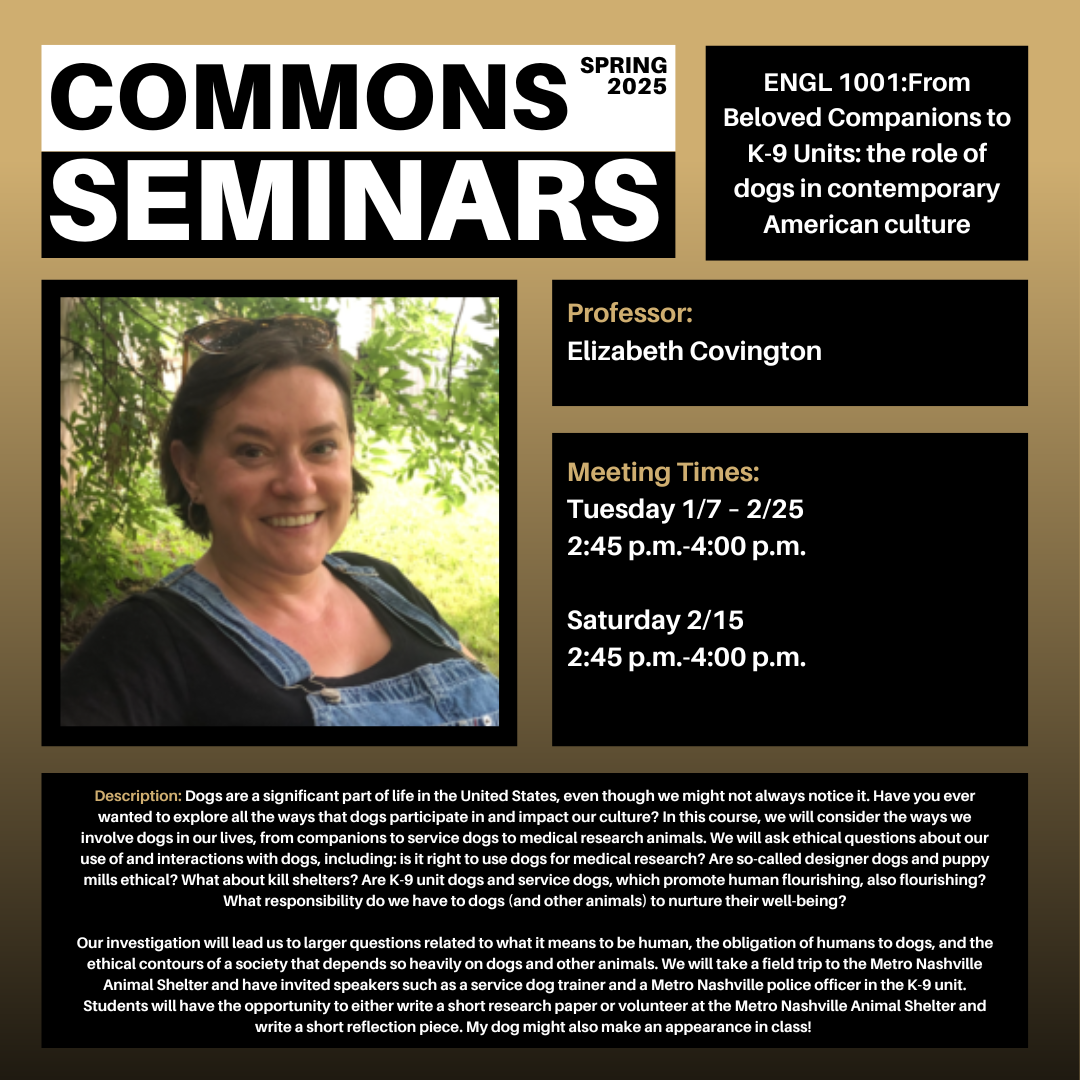
Dogs are a significant part of life in the United States, even though we might not always notice it. Have you ever wanted to explore all the ways that dogs participate in and impact our culture? In this course, we will consider the ways we involve dogs in our lives, from companions to service dogs to medical research animals. We will ask ethical questions about our use of and interactions with dogs, including: is it right to use dogs for medical research? Are so-called designer dogs and puppy mills ethical? What about kill shelters? Are K-9 unit dogs and service dogs, which promote human flourishing, also flourishing? What responsibility do we have to dogs (and other animals) to nurture their well-being?
Our investigation will lead us to larger questions related to what it means to be human, the obligation of humans to dogs, and the ethical contours of a society that depends so heavily on dogs and other animals. We will take a field trip to the Metro Nashville Animal Shelter and have invited speakers such as a service dog trainer and a Metro Nashville police officer in the K-9 unit. Students will have the opportunity to either write a short research paper or volunteer at the Metro Nashville Animal Shelter and write a short reflection piece. My dog might also make an appearance in class!
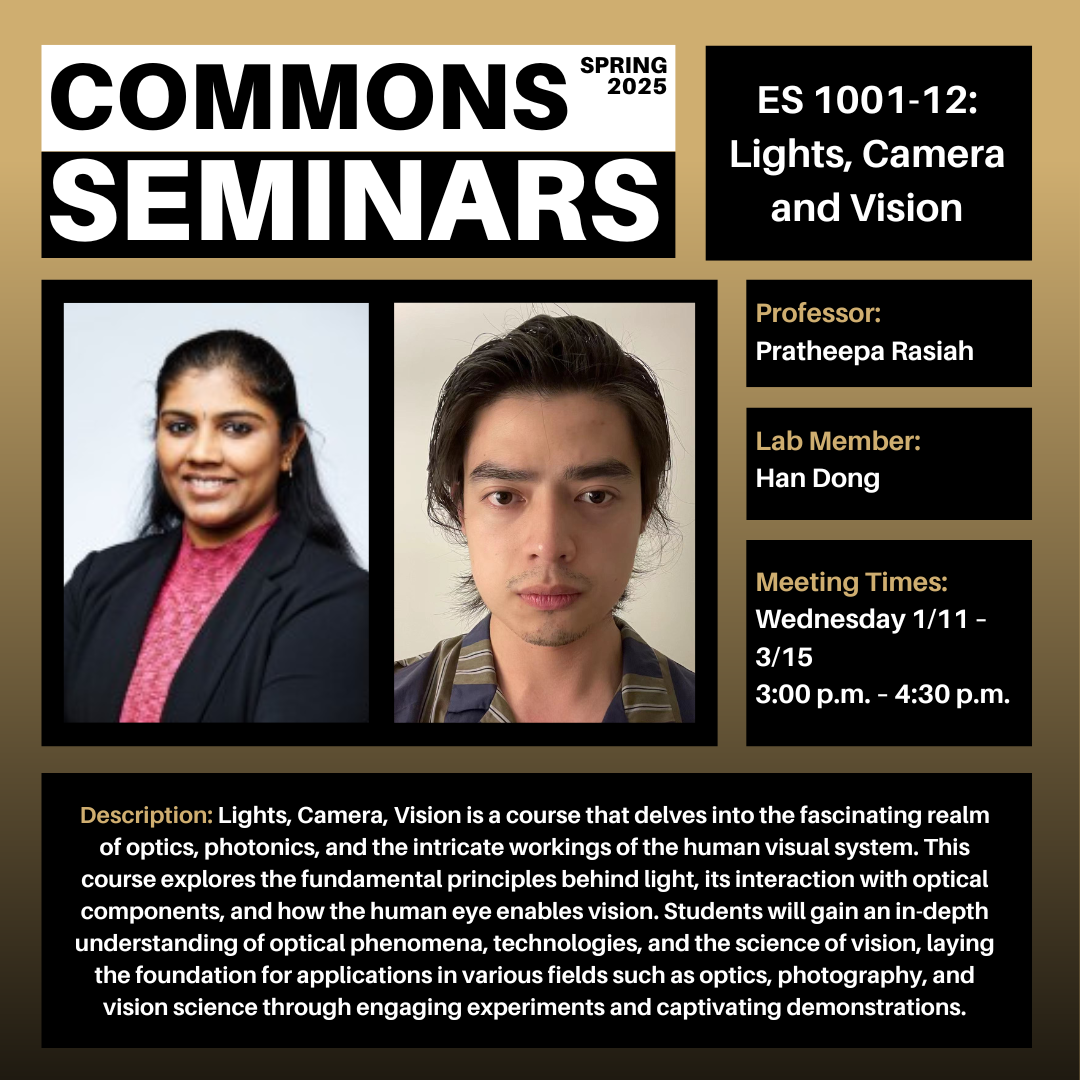
Lights, Camera, Vision is a course that delves into the fascinating realm of optics, photonics, and the intricate workings of the human visual system. This course explores the fundamental principles behind light, its interaction with optical components, and how the human eye enables vision. Students will gain an in-depth understanding of optical phenomena, technologies, and the science of vision, laying the foundation for applications in various fields such as optics, photography, and vision science through engaging experiments and captivating demonstrations
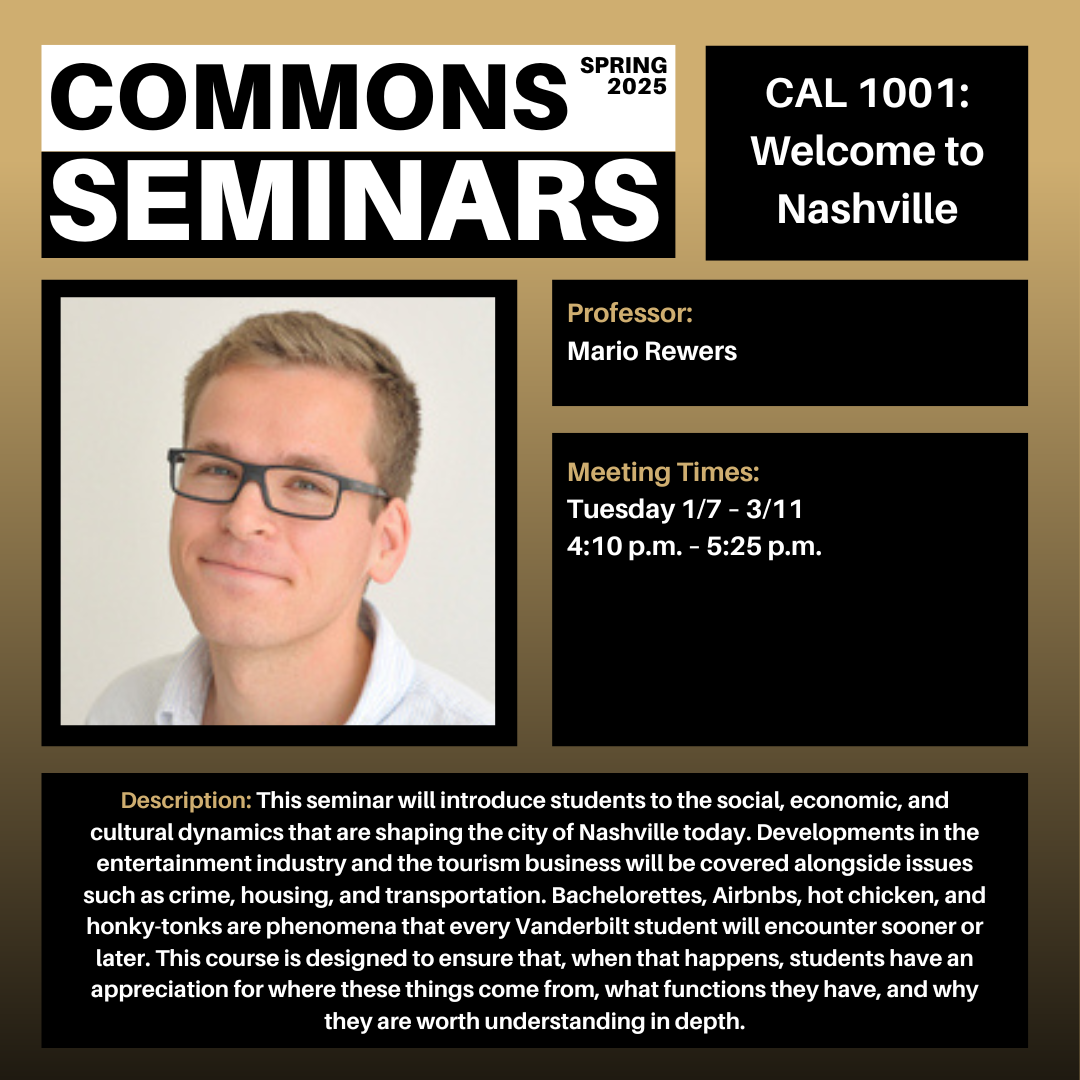
This seminar will introduce students to the social, economic, and cultural dynamics that are shaping the city of Nashville today. Developments in the entertainment industry and the tourism business will be covered alongside issues such as crime, housing, and transportation. Bachelorettes, Airbnbs, hot chicken, and honky-tonks are phenomena that every Vanderbilt student will encounter sooner or later. This course is designed to ensure that, when that happens, students have an appreciation for where these things come from, what functions they have, and why they are worth understanding in depth.
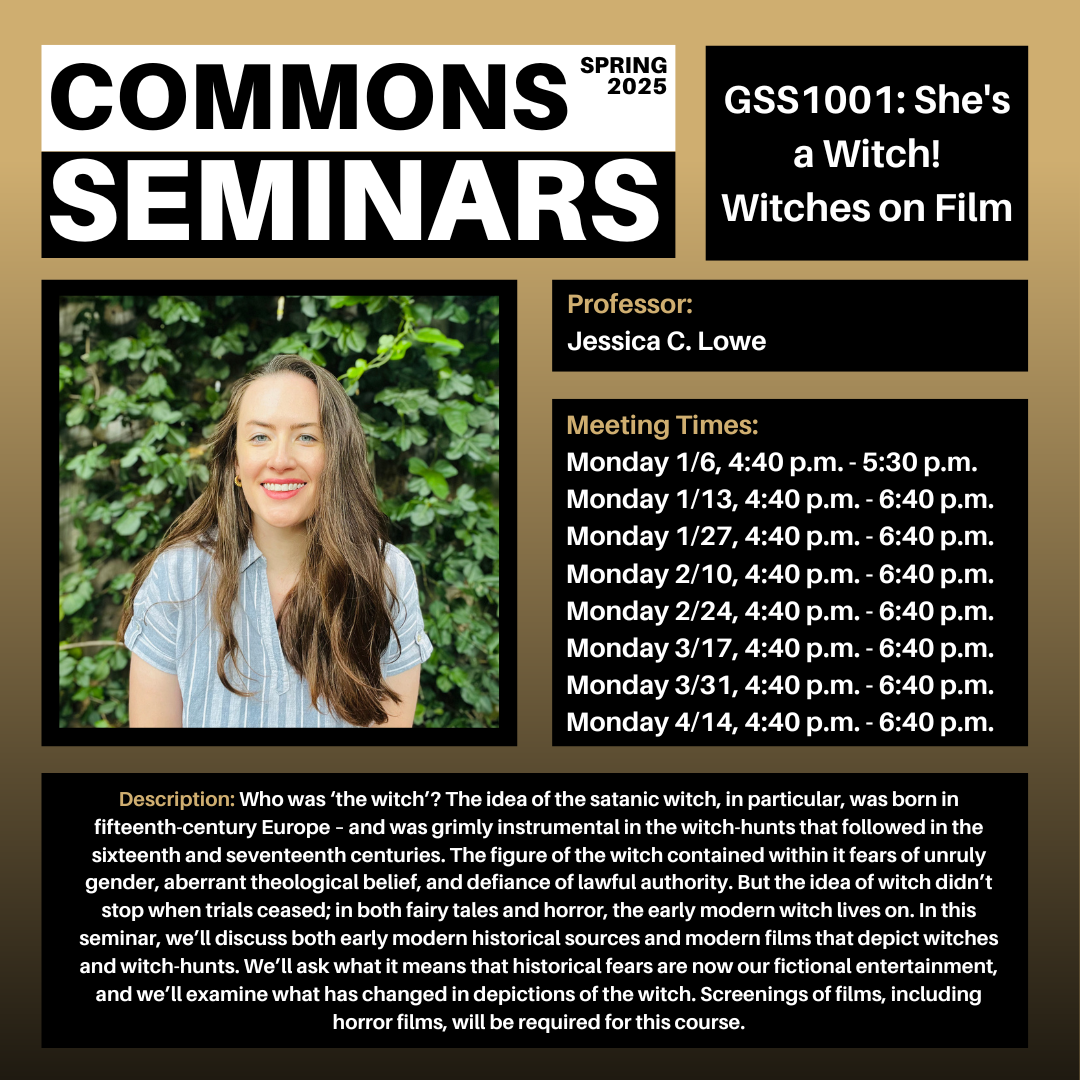
Who was ‘the witch’? The idea of the satanic witch, in particular, was born in fifteenth-century Europe – and was grimly instrumental in the witch-hunts that followed in the sixteenth and seventeenth centuries. The figure of the witch contained within it fears of unruly gender, aberrant theological belief, and defiance of lawful authority. But the idea of witch didn’t stop when trials ceased; in both fairy tales and horror, the early modern witch lives on. In this seminar, we’ll discuss both early modern historical sources and modern films that depict witches and witch-hunts. We’ll ask what it means that historical fears are now our fictional entertainment, and we’ll examine what has changed in depictions of the witch. Screenings of films, including horror films, will be required for this course.
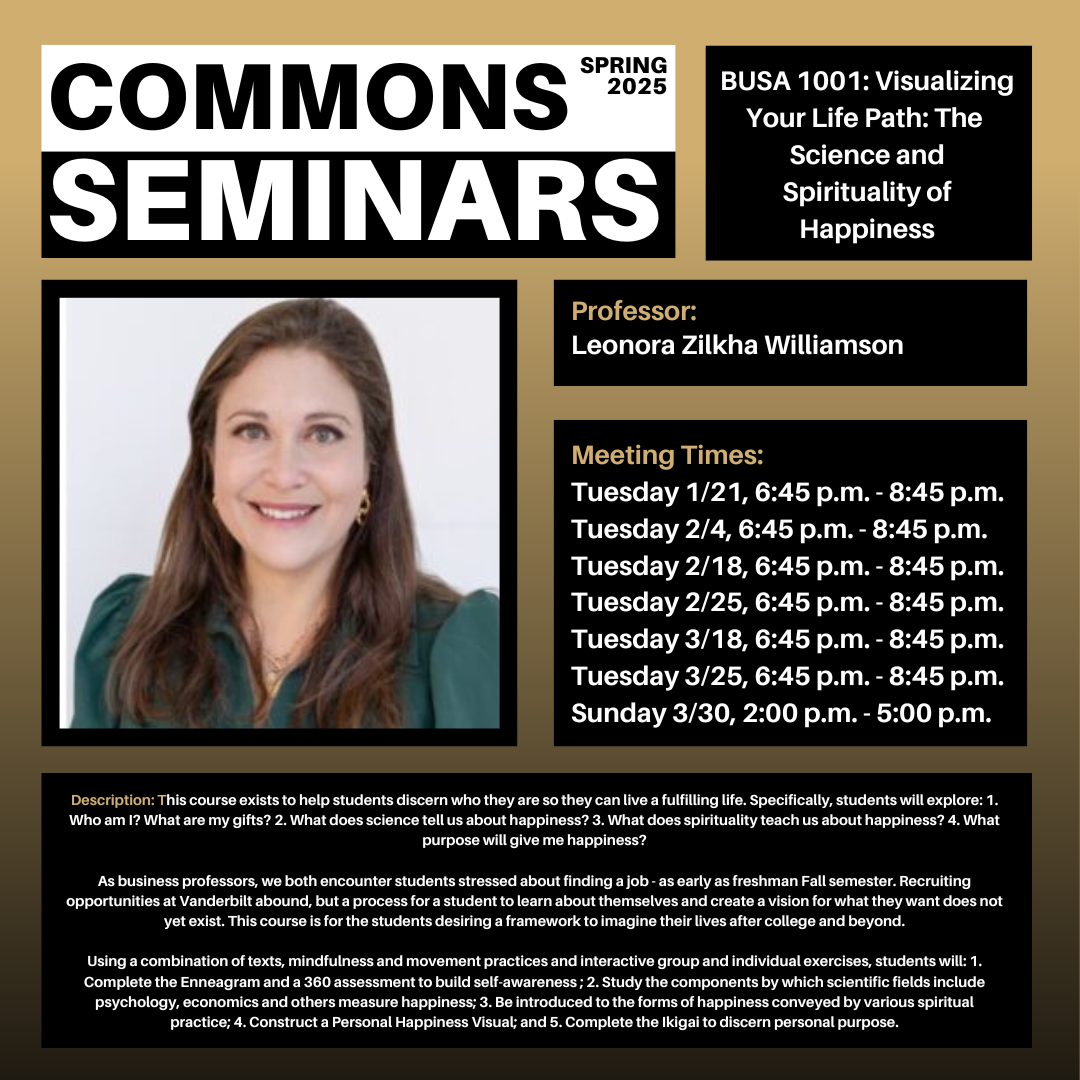
This course exists to help students discern who they are so they can live a fulfilling life. Specifically, students will explore:
1. Who am I? What are my gifts?
2. What does science tell us about happiness?
3. What does spirituality teach us about happiness?
4. What purpose will give me happiness?
As business professors, we both encounter students stressed about finding a job - as early as freshman Fall semester. Recruiting opportunities at Vanderbilt abound, but a process for a student to learn about themselves and create a vision for what they want does not yet exist. This course is for the students desiring a framework to imagine their lives after college and beyond.
Using a combination of texts, mindfulness and movement practices and interactive group and individual exercises, students will:
1. Complete the Enneagram and a 360 assessment to build self-awareness
2. Study the components by which scientific fields include psychology, economics and others measure happiness
3. Be introduced to the forms of happiness conveyed by various spiritual practice
4. Construct a Personal Happiness Visual
5. Complete the Ikigai to discern personal purpose
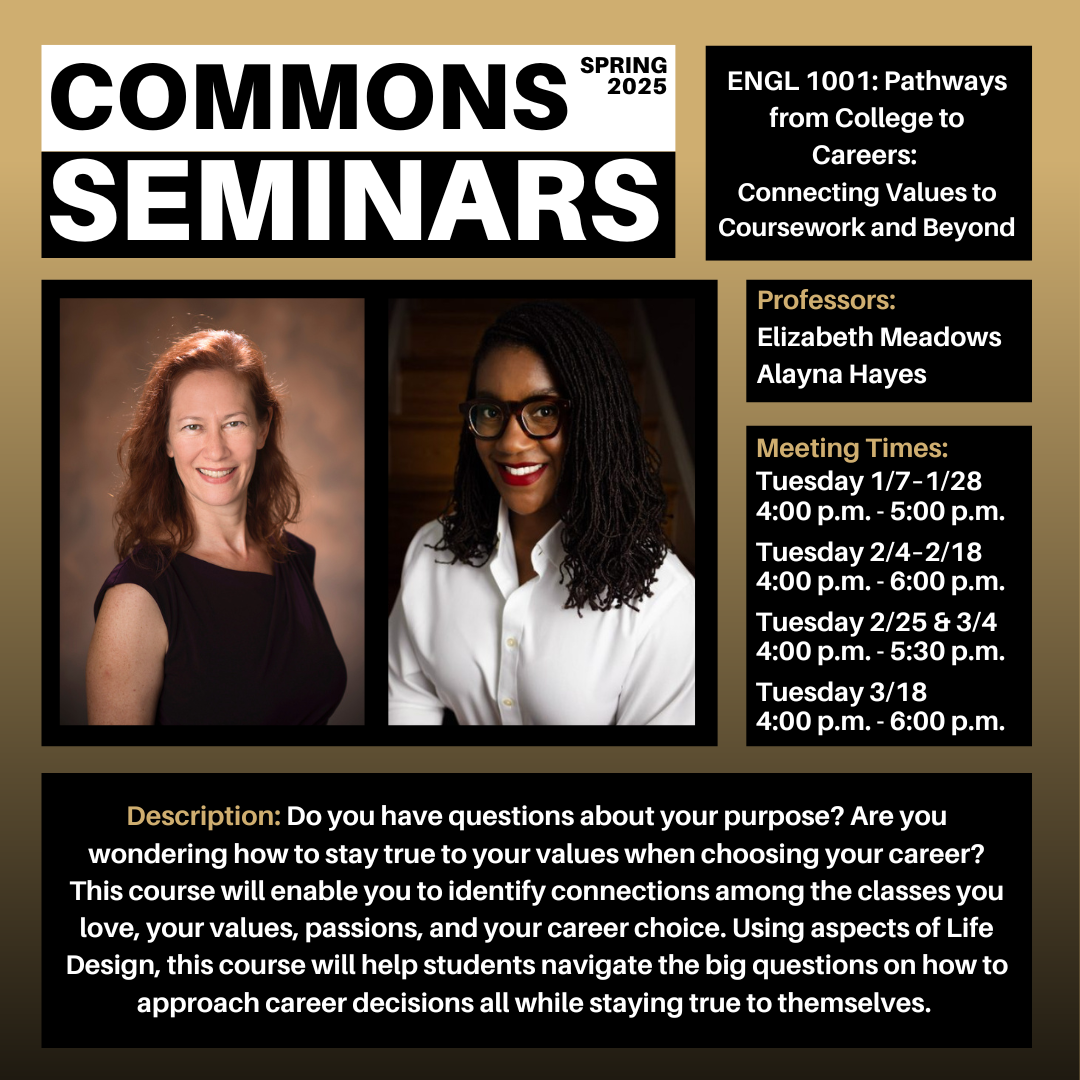
Do you have questions about your purpose? Are you wondering how to stay true to your values when choosing your career? This course will enable you to identify connections among the classes you love, your values, passions, and your career choice. Using aspects of Life Design, this course will help students navigate the big questions on how to approach career decisions all while staying true to themselves.
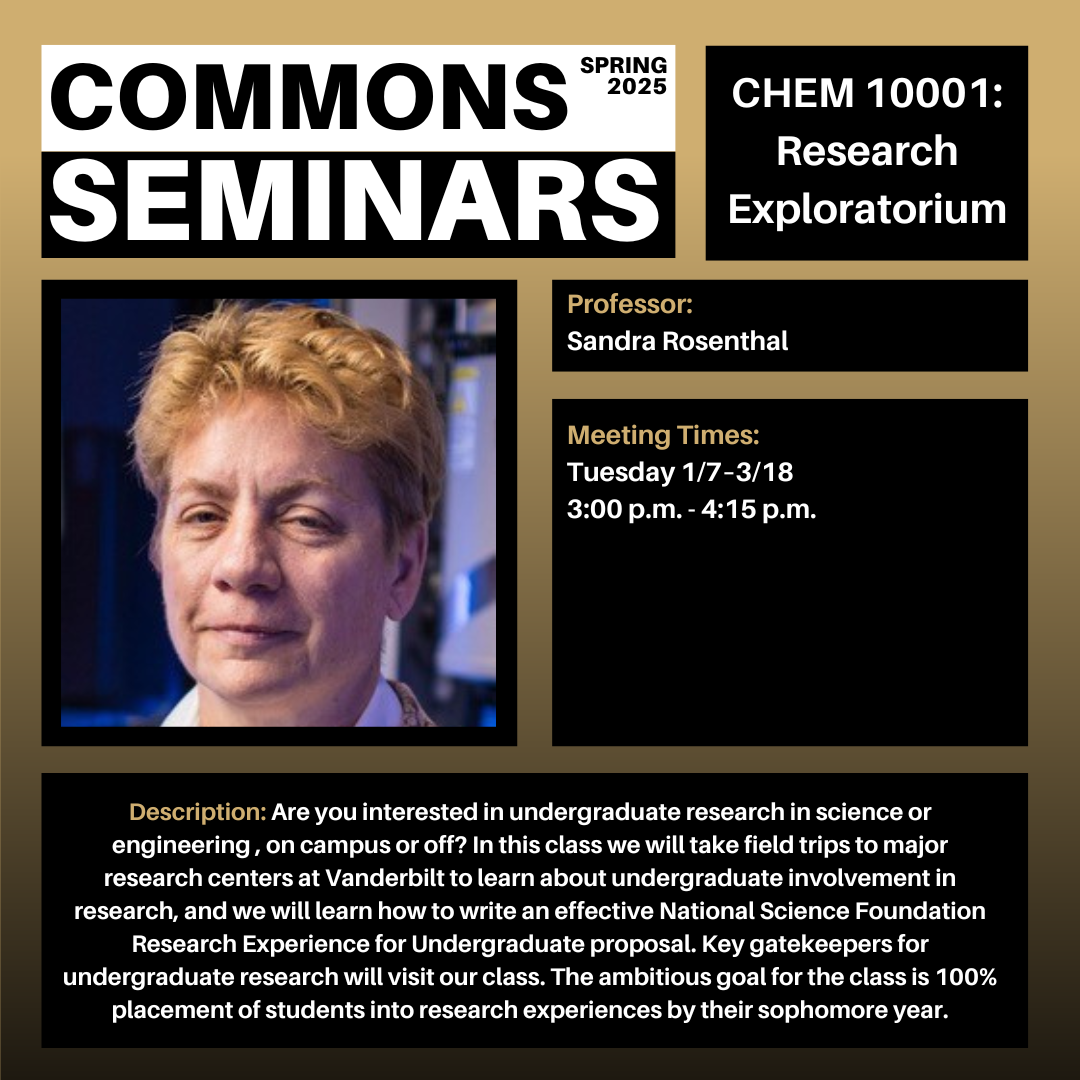
Are you interested in undergraduate research in science or engineering , on campus or off? In this class we will take field trips to major research centers at Vanderbilt to learn about undergraduate involvement in research, and we will learn how to write an effective National Science Foundation Research Experience for Undergraduate proposal. Key gatekeepers for undergraduate research will visit our class. The ambitious goal for the class is 100% placement of students into research experiences by their sophomore year.
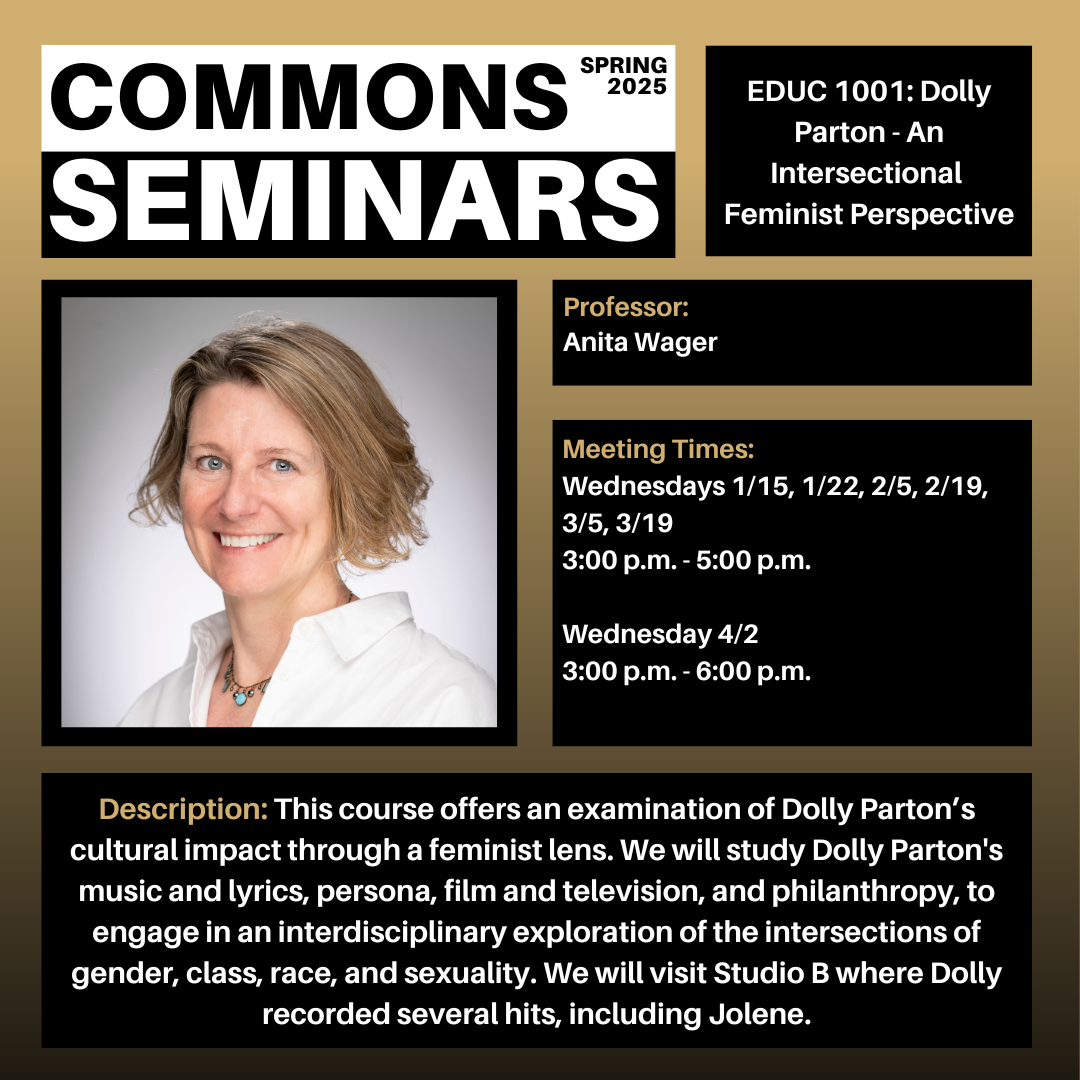
This course offers an examination of Dolly Parton’s cultural impact through a feminist lens. We will study Dolly Parton's music and lyrics, persona, film and television, and philanthropy, to engage in an interdisciplinary exploration of the intersections of gender, class, race, and sexuality. We will visit Studio B where Dolly recorded several hits, including Jolene, and the Country Music Hall of Fame where we will take a Song Writing 101 class.
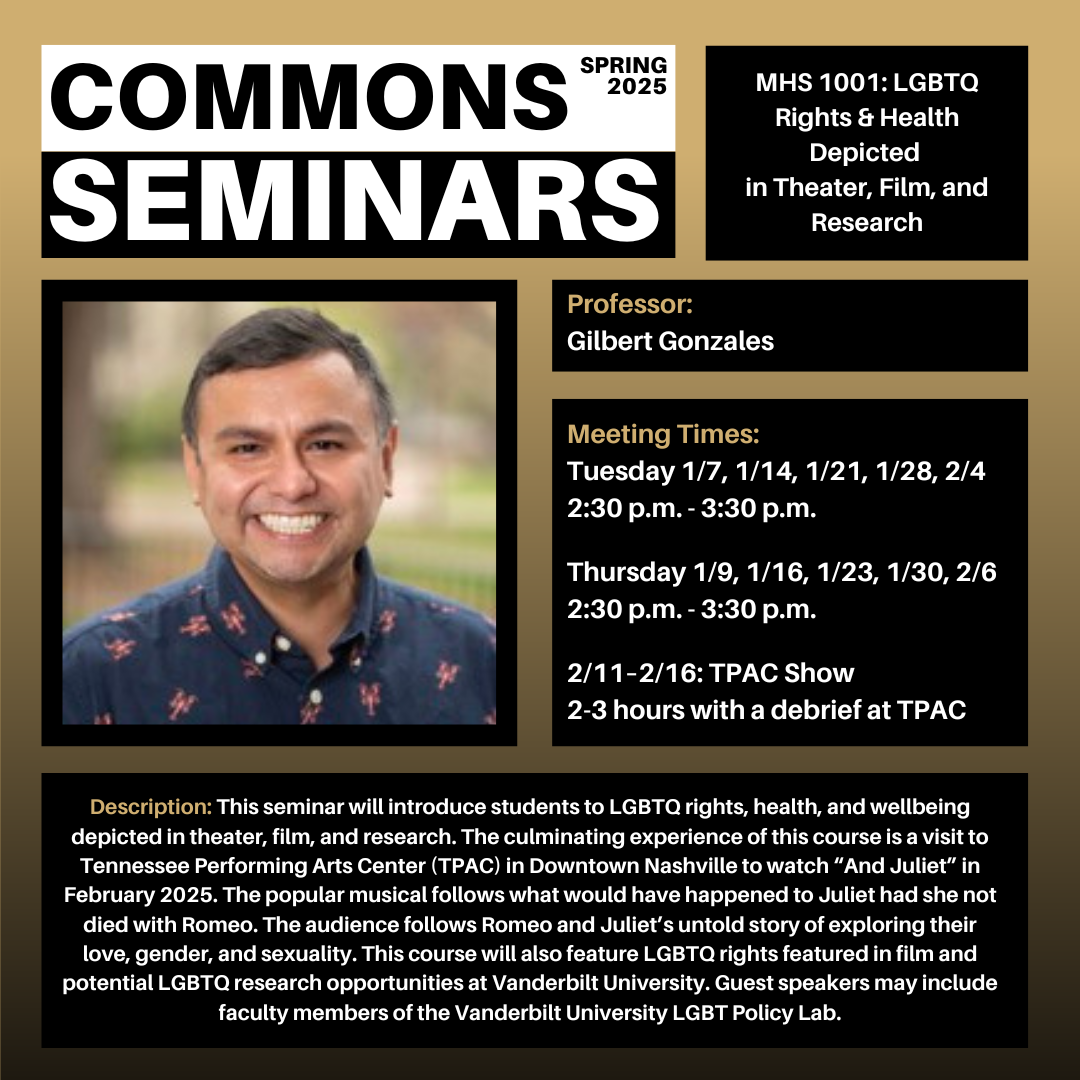
This seminar will introduce students to LGBTQ rights, health, and wellbeing depicted in theater, film, and research. The culminating experience of this course is a visit to Tennessee Performing Arts Center (TPAC) in Downtown Nashville to watch “And Juliet” in February 2025. The popular musical follows what would have happened to Juliet had she not died with Romeo. The audience follows Romeo and Juliet’s untold story of exploring their love, gender, and sexuality. This course will also feature LGBTQ rights featured in film and potential LGBTQ research opportunities at Vanderbilt University. Guest speakers may include faculty members of the Vanderbilt University LGBT Policy Lab.
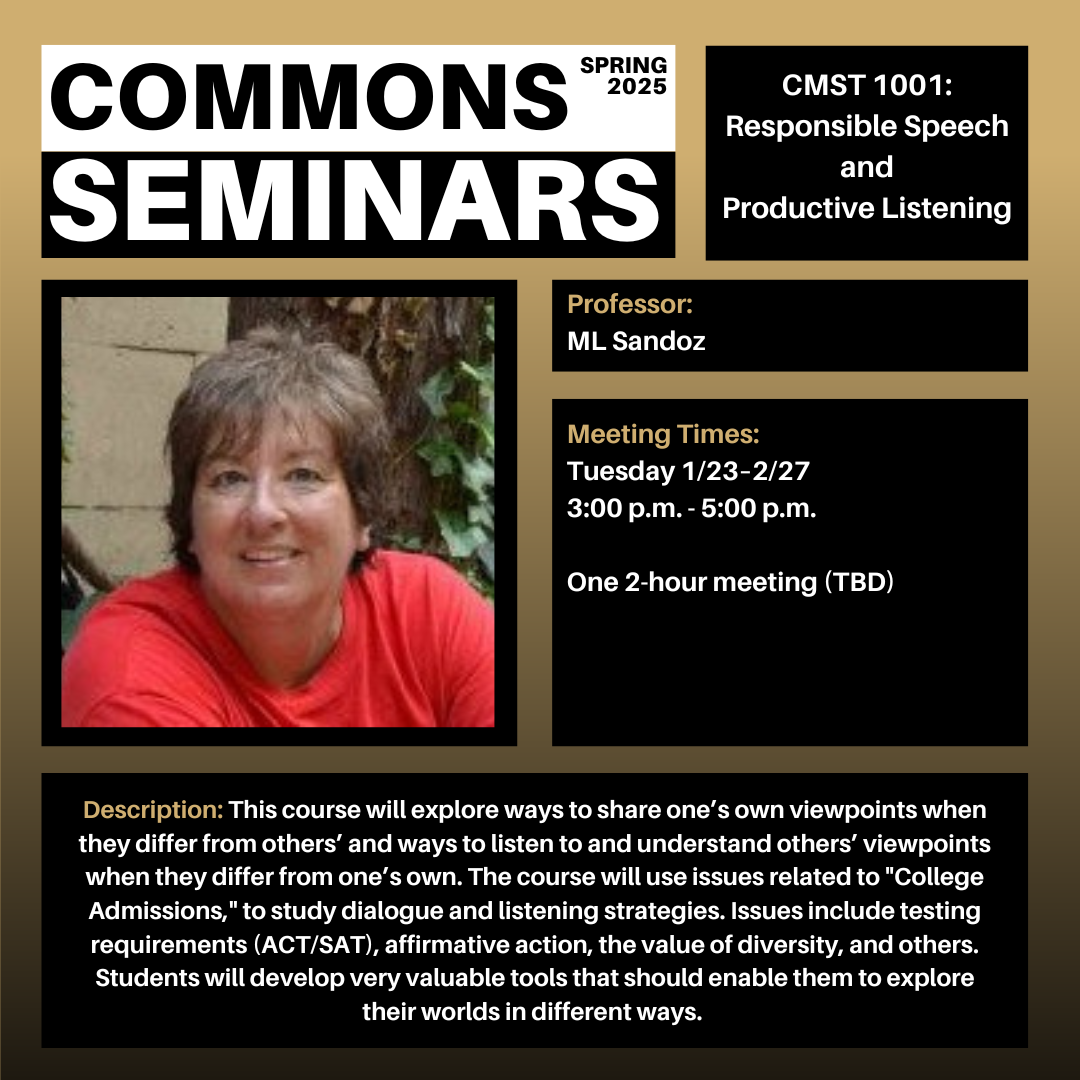
This course will explore ways to share one’s own viewpoints when they differ from others’ and ways to listen to and understand others’ viewpoints when they differ from one’s own. The course will use issues related to "College Admissions," to study dialogue and listening strategies. Issues include testing requirements (ACT/SAT), affirmative action, the value of diversity, and others. Students will develop very valuable tools that should enable them to explore their worlds in different ways.
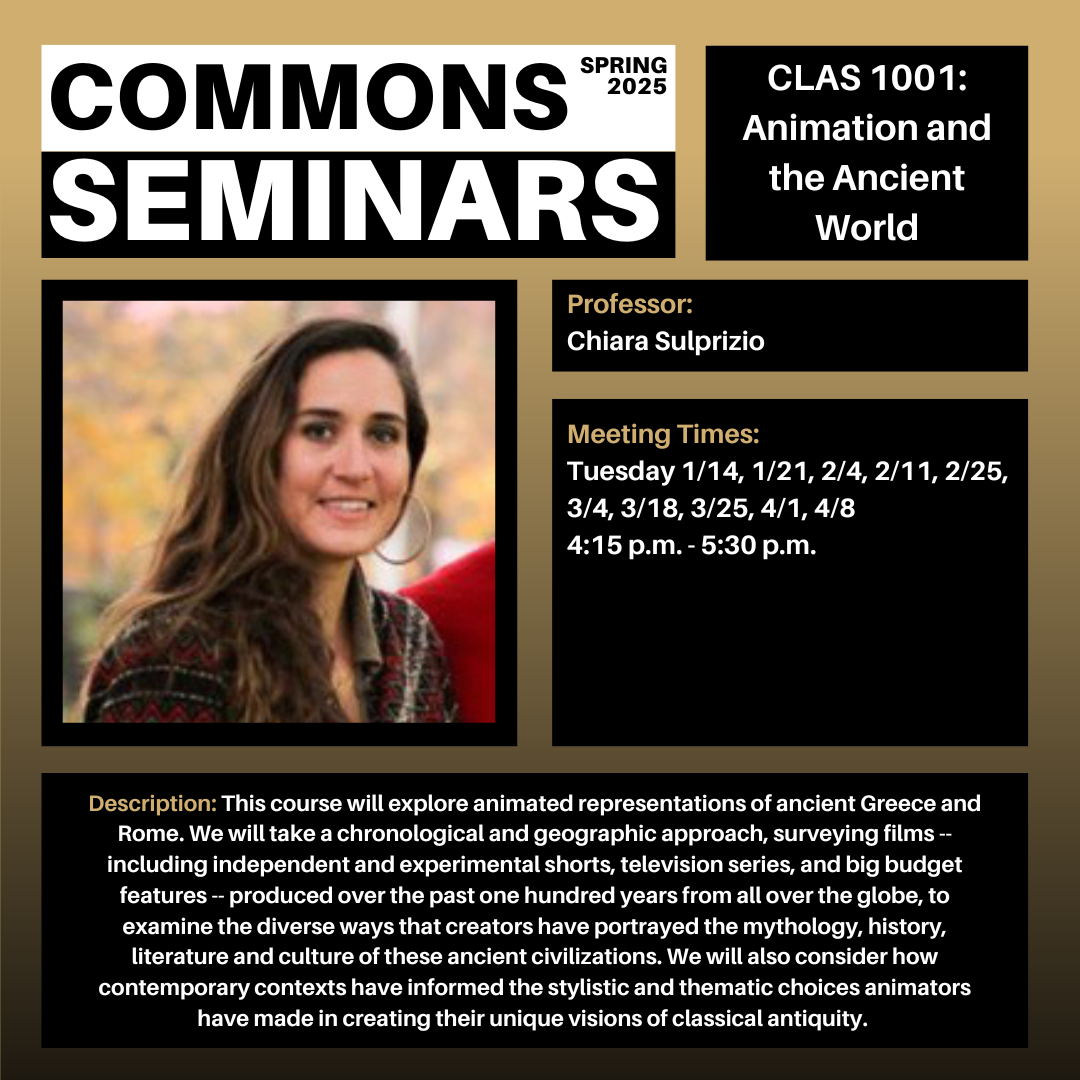
This course will explore animated representations of ancient Greece and Rome. We will take a chronological and geographic approach, surveying films -- including independent and experimental shorts, television series, and big budget features -- produced over the past one hundred years from all over the globe, to examine the diverse ways that creators have portrayed the mythology, history, literature and culture of these ancient civilizations. We will also consider how contemporary contexts have informed the stylistic and thematic choices animators have made in creating their unique visions of classical antiquity.
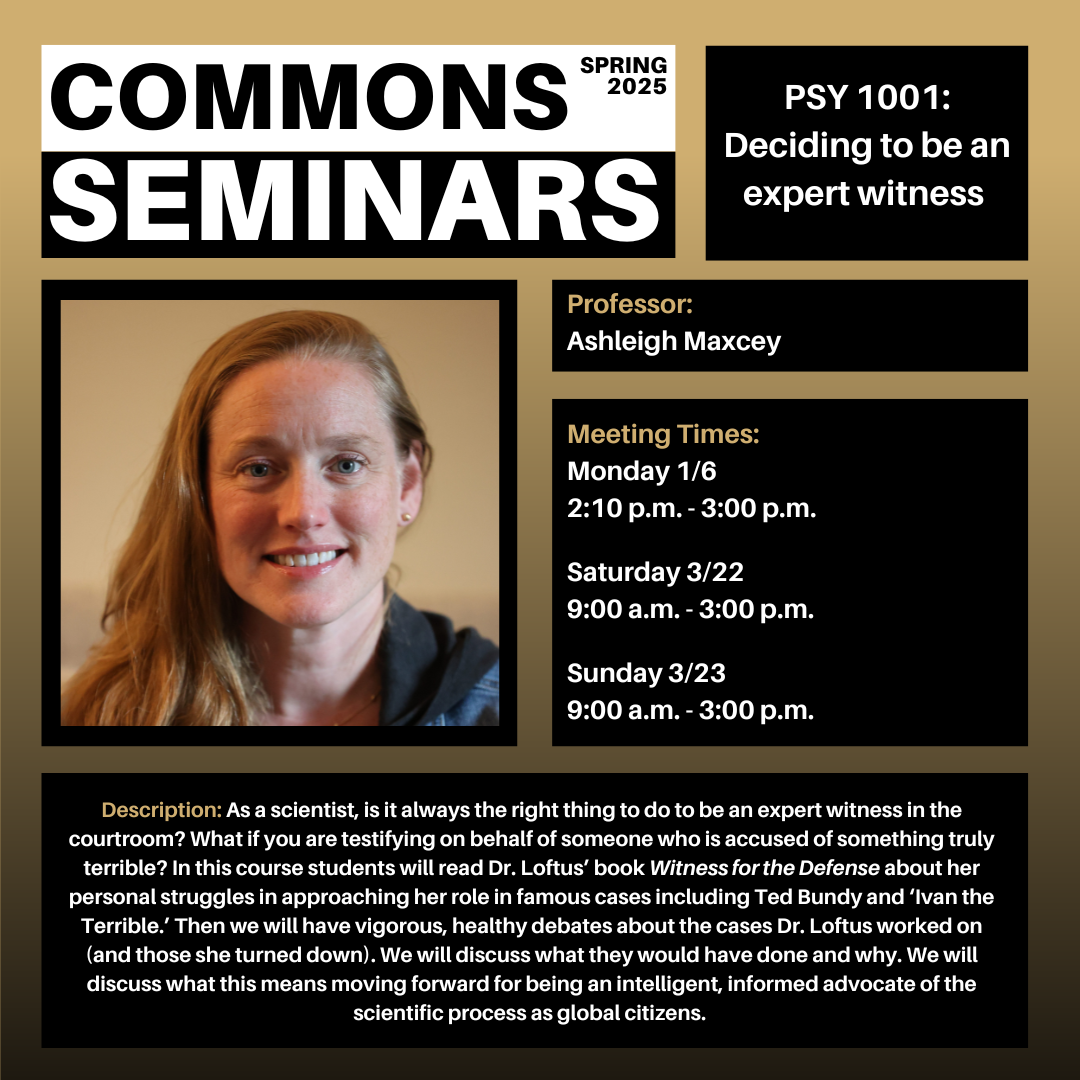
As a scientist, is it always the right thing to do to be an expert witness in the courtroom? What if you are testifying on behalf of someone who is accused of something truly terrible? In this course students will read Dr. Loftus’ book Witness for the Defense about her personal struggles in approaching her role in famous cases including Ted Bundy and ‘Ivan the Terrible.’ Then we will have vigorous, healthy debates about the cases Dr. Loftus worked on (and those she turned down). We will discuss what they would have done and why. We will discuss what this means moving forward for being an intelligent, informed advocate of the scientific process as global citizens.

You must be logged in to post a comment.